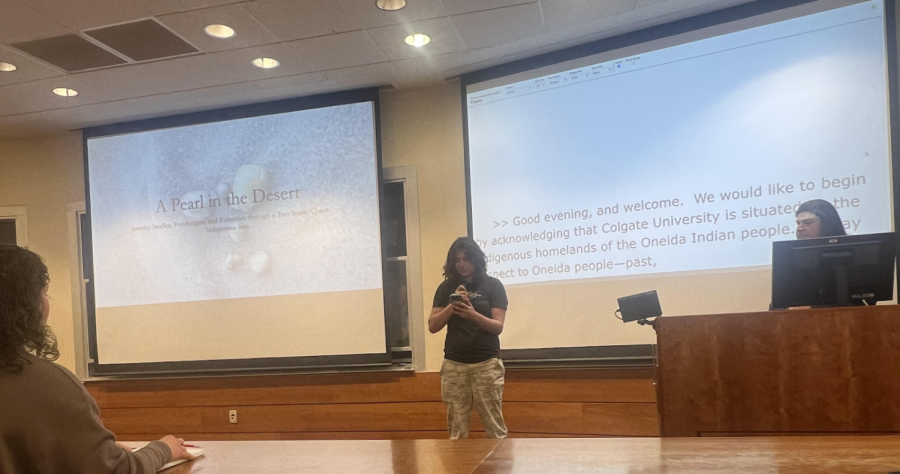Damien Paul Montaño kicks off Colgate’s annual Race and Education series
Damien Paul Montaño’s lecture, “A Pearl in the Desert: Jewelry Studies, Foodscapes and Futurities Through a Two Spirit/Queer Indigenous Lens,” had every seat in Ho 101 filled and people lining the stairs in the lecture hall on Tuesday, Mar. 21. This lecture was a part of the Department of Education’s annual Race and Education lecture series that began in 2001. The purpose of this lecture series is to engage and educate students in a discussion about the critical issues of race and its impact on education and society.
Montaño is a Two Spirit promoter of indigenous arts and jewelry designer as well as an educator and artist. Their personal tribal connections are with the Yoeme, Purépacha and Papago communities. Montaño’s work and relationships involve community and academic organizations in addition to collaborations with Seri/Comca’ac artisans living in the Village of Haxol Iihom/Desemboque located in Sonora, Mexico. One of Montaño’s main academic fields of interest highlighted throughout their lecture is Gender and Sexuality in American Indian Communities.
Throughout his lecture, Montaño utilized aspects of their “Cariño pedagogy” and the “Trensa model.” The Cariño pedagogy refers to the affectionate, loving and inclusive space they seek to develop through their discussion. The Trensa model is based on the weaving of different strands, different themes, ideas or theories together to create a more interconnected, in-depth understanding of how topics, such as race and education, are closely interwoven despite being different subjects. Considering these concepts, Montaño emphasized the importance of incorporating love into work, which in their case is not hard work, but heart work.
“Embed love into our work, dare we be vulnerable in the work that we do here in these educational settings,” Montaño said.
Montaño began the lecture with an introduction to their identity and the main influences in their life, which include their immediate family, ancestors and cat. They also explained what the term Two Spirit means – Two Spirit is a term coined in 1990 that incorporates both Western and Indigenous understanding of sexuality and gender. Within the Two Spirit concept, gender is a range of identities that redefine traditional ideas about “male” and “female.” Two Spirit allows contemporary Native peoples to reclaim the gender and spiritual roles in Native gender systems in a diverse, inclusive way.
Students resonated with the personal aspect of the lecture and the different perspectives offered by Montaño. First-year Ciara Sanders commented on her appreciate for the structure of the lecture.
“I appreciated the personal touch he added to the presentation, and I felt as though it transcended traditional Western teaching,” Sanders said.
Montaño continued the lecture by examining “the pearls in the desert,” understood as seemingly small but meaningful aspects of life, that he has observed throughout his work with the Seri. One “pearl” Montaño focuses on is food and its connection to indigenous communities. Communities such as the Seri value nature’s food sources such as the Cardon cactus or mesquite trees. The value of this food extends beyond consumption, as it is used in jewelry, basketry and carvings. Montaño also explained how they incorporate indigenous foods in his daily life to stay connected to their roots, for example by making tortillas with mesquite beans.
The art indigenous communities produce are valuable pearls of their culture, as well, and are not just pieces of art, but codexes or documents that tell a story about the community, as Montaño explains regarding Seri basketry.
“They have the DNA of the artists and relationships with land embedded in them,” Montaño said.
However, the Seri community and other indigenous communities remain threatened by aspects of modernity despite efforts to adapt. Road and pipeline projects invade indigenous spaces and the unique lifestyle of those indigenous communities that allows them to live in a more authentic, traditional way. While modernity has provided some benefits for these communities, its encroaching, invasive presence often overpowers its advantages.
Montaño’s lecture highlighted pearls they have found throughout their life and work with indigenous communities, which culminated in an insightful, inspiring lecture. They emphasized the importance of passion and vulnerability in work. The meaningful topics and advice Montaño brought up throughout his lecture resonated with students like first-year Elena Myatt.
“It was really cool to see the university giving a platform to underrepresented voices and facilitating discussion about native issues,” Myatt explained. “It was great that the university celebrated its heritage of using native land, making the talk feel very relevant.”
A concluding thought Montaño left students with was their promotion of embracing all of an individual’s identities. They encouraged a weaving together of various identities; Montaño can be both queer and indigenous, not one or the other, and this mindset allows Montaño to truly be themself. Embracing our authentic selves and recognizing our worth is a message Montaño emphasized.
“I just want us to remember that whatever we do in the world […] we’re more than our professions, we’re more than our titles. We have so much more to offer this world. So we’re really the pearls in this world, right?” Montaño asked.
Montaño’s lecture marked a successful start to the 2023 Race and Education series. The information and broadened, inclusive perspective Montaño brought were invaluable in educating students on current, critical issues in addition to encouraging an embrace of every individual’s unique identities.

Allie Kavalauskas is a sophomore from Augusta, KA concentrating in international relations with a topical concentration in Spanish and Italian. She has...









